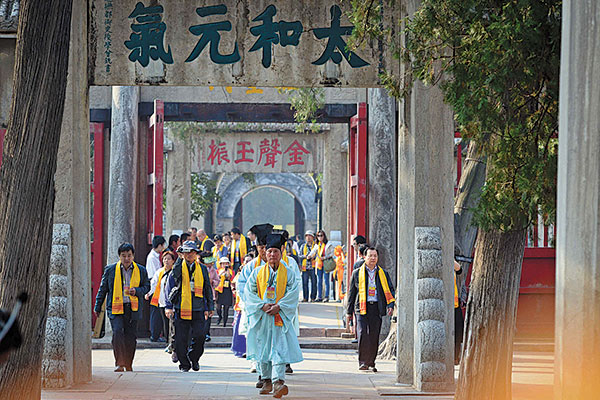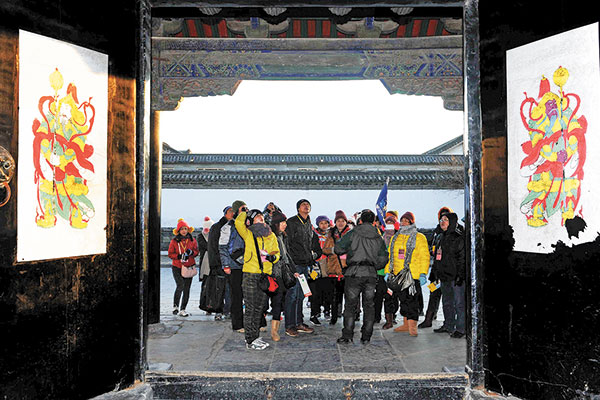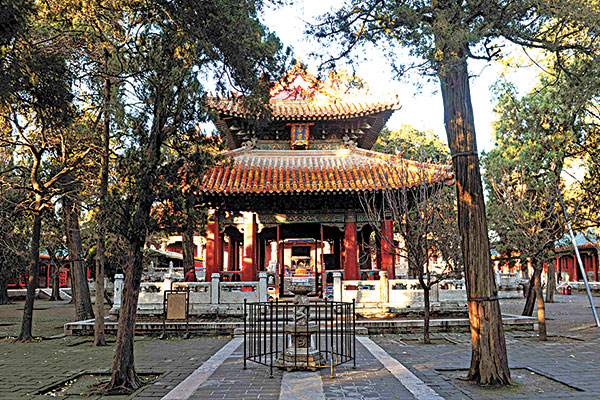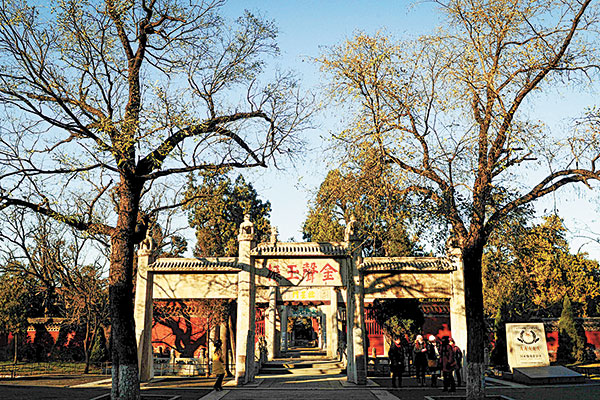
The Confucius-worship ceremony is held on Sept 28 every year to commemorate the philosopher’s birthday. The Qufu Confucian Academy also organizes smaller-scale ceremonies for visitors.[Photo/Provided to China Daily]
Want to get away from the city for a quiet weekend? Take a high-speed train from Beijing on Saturday morning and make a pilgrimage to Confucius (551-479 BC)’ hometown in Qufu, Shandong province.
If you are traveling in a group, you may want to rent an electric carriage to tour the city after a brief lunch. Guides in traditional Han clothes will provide short lectures in the carriage on Confucian rituals and perform the tea ceremony. The local fine tea is certainly good spiritual refreshment, and a good way to start the journey.
First stop is the Temple of Confucius. This institution, together with the Kong Family Mansion, where Confucius’ descendants lived, and the Cemetery of Confucius in the city, were anointed as UNESCO World Heritages in 1994.
The temple and the family mansion are downtown. A quick 1.5-hour tour of the two sites provides you with the rich history and philosophy of Confucian thought, and encourages you to reflect on your our own behavior in daily life.
The buildings are not as splendid as the giant palaces and temples in Beijing, but their slightly dim color may explain the vicissitudes of the times better. Passing under one arch after another, one cannot help but recall Confucius’ sayings about courtesy, harmony in the family, rituals, and the many other fundamental elements that define the Chinese people’s spirits.
In front of the main temple is a cluster of flourishing ancient trees, among which one is said to be more than 2,000 years old. Steles line the yard, recording celebrated people’s eulogies for Confucius. Twelve of them were carved with passages written by emperors.

Tourists visit the Kong Family Mansion.[Photo/Provided to China Daily]
Kong Decheng (1920-2008), the last Confucius descendant who lived in the mansion, left Qufu for Taiwan in 1949. Today’s Kong Family Mansion, with its layout and detailed presentation of life in the old days, is more of a reflection of traditional rituals in Chinese families. Confucius lived in a few thatched cabins, but rulers in the succeeding dynasties continued to enlarge the area.
Though the mansion has no permanent resident, there are 130,000 people in Qufu, out of a population of 640,000, with the surname Kong.
“I am so proud to be a son of the temple’s guard,” says Kong Weifeng, a local elementary school teacher who voluntarily gives lectures on Confucianism to local villagers in the countryside. “What Confucius taught is in our belief and blood.”
The Cemetery of Confucius, where he and his descendants were buried, is probably China’s oldest and largest family cemetery, with 4,000 pieces of stele and about 100,000 tombs. Two kilometers north of the temple, it is a place for quiet meditation.
Dinnertime is never boring. During the reign of Qianlong (1736-96), the Kong mansion cuisine was created based on Shandong flavors. The dishes are delicately and artfully displayed. Some restaurants organize rituals honoring Confucius before the meal, which are probably too complicated for today’s people, but they offer an unusual experience.

The Apricot Platform, from which Confucius taught his students.[Photo/Provided to China Daily]
Group dancing shows about Confucius are staged every evening from April to November in the downtown’s Xingtan Theater, acting as a fine after-dinner dessert to digest the day’s rich banquet of culture. Xingtan is named after the place where the sage gave lectures.
On Sunday morning, you may watch or join in a Confucius-worship ceremony in the Qufu Confucian Academy. Note that the ceremony will only be organized for groups of more than 20 people. The largest-scale ceremony in the Temple of Confucius was held on Sept 28, the birthday of Confucius.
The academy also provides opportunities to learn the “Six Arts” recommended by Confucians, including horse-riding, archery, and playing traditional Chinese musical instruments. You may also don traditional Han clothes and listen to a lecture on Confucianism in the sacred educator’s hometown.
You must, of course, visit Confucius’ birthplace, which is in a small cave on Nishan Hill in neighboring Sishui county. It is a 40-minute shuttle bus ride away from downtown. There are also a smaller Confucius temple and a traditional academy in Nishan, which are quieter and more conducive for meditation.
IF YOU GO
Getting from Beijing
· Train G11 Beijing South Railway Station-Qufu East Railway Station (8:00 am to 10:06 am)
· Train G150 Qufu East Railway Station-Beijing South Railway Station (7:22 pm-9:41 pm)
Accommodation
· Shangri-la Hotel, Qufu
Tel: 0537-505 8888
Website: www.shangri-la.com/cn/qufu/shangrila
· Oriental Confucian Garden Hotel
Tel: 0537-505 3777
Website: www.ocghotel.com/
Other tips: Individual entrance ticket for the Temple of Confucius, Kong Family Mansion, and Cemetery of Confucius is 150 yuan ($24.5) for all three sites.
Open Hour: 8 am-6pm (April to October) 8 am-5 pm (November to March)

Gateway of Striking Golden Bell and Beating Jade.[Photo/Provided to China Daily]
